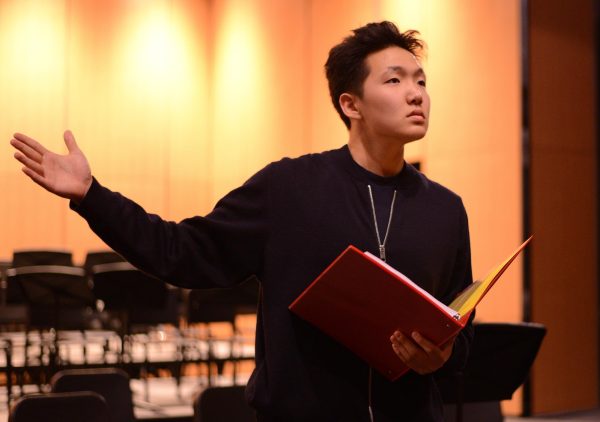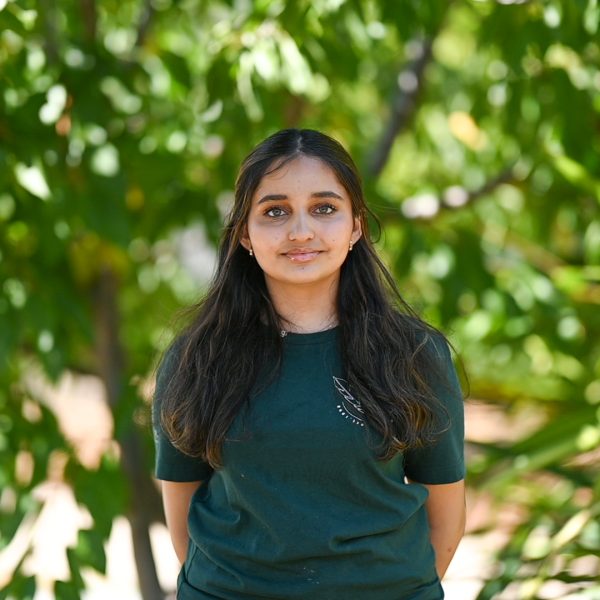
Standing center stage in the Rothschild Performing Arts Center, senior Jason Shim commands the room with confident gestures and expressive facial cues, fully engaged in every note of Harker’s Downbeat show choir performance. The rhythm of the music, the synchronization of voices and the energy of the performance reflect months of hard work and countless hours of practice. For Jason, who joined Downbeat in his senior year, the experience is more than just singing and dancing. It’s about finding joy in teamwork and building a community.
“There’s never a dull moment in Downbeat,” Jason said. “There’s always some personality, some inside joke, and that’s really helped us as a group to gel. We balance having fun with being disciplined, and that’s what makes it so rewarding.”
Jason’s journey with music and theater began as a frosh exploring new interests after the COVID-19 pandemic. He joined the musical theater certificate program seeking a challenge, and in the process, found a space for belonging and growth.
“Coming out of COVID, I was realizing that I was sorely lacking in confidence as a person, as a performer, and so I wanted to really commit to learning something,” Jason said. “So I committed myself to the musical theater certificate program and participated in the spring musical all four years. Through that, I learned how to work as a team player, how to be a stronger performer and how to be more confident.”
For Jason, theater has also been a place of connection, where he builds friendships that extend beyond the stage. Close friend senior Grant Yang, who has known Jason since middle school and performs alongside him in Downbeat, admires his ability to keep things lighthearted while remaining dedicated to his craft.
“Jason’s the guy who will go along with any idea,” Grant said. “He doesn’t take himself too seriously, and he’s always up for a bit, whether it’s something completely random or a last-minute plan to make a performance more fun. That energy makes a huge difference.”
Jason brings that same spirit to his acting, channeling both enthusiasm and thoughtfulness into each role. He takes pride in diving deep into his characters, striving to understand their motivations and portray their stories with authenticity. His approach often mirrors the kind of historical research he enjoys outside of theater, as he carefully examines context, background and perspective to bring depth to each performance.
“Last year, I played Glenn Guglia in “The Wedding Singer” — he’s not a great guy,” Jason said. “He’s a womanizer, an adulterer and a partier, but I tried to empathize with him and understand his perspective. Acting is a wonderful exercise in seeing the world through someone else’s eyes, and that ties back to the research I do and the way I approach life in general.”
That same curiosity about people and their motivations extends beyond the stage and into Jason’s academic life. As a Near Mitra scholar, a participant in Harker’s humanities research program, he spent many hours researching the connections between African-American reformers during the Reconstruction era and the Korean independence movement at the turn of the 20th century. His project centers on the journals of Yoon Chi-ho, a Korean missionary who, influenced by American reformers, advocated for education as a means of empowerment.
“Anything related to Korean independence is very close to my heart,” Jason said. “My grandfather fought for the Korean independence movement, and that sense of national pride is deeply ingrained in my family. This research has given me a way to connect with that legacy while exploring the intersections of imperialism, identity and history.”
This personal connection made the work especially meaningful, but it also pushed him to think critically and engage deeply with his sources. While the niche nature of his topic made it difficult to find sources and existing scholarship, Jason embraced the challenge, leaning into collaboration and feedback to strengthen his ideas. He recalls one scholar session hosted by Harker librarians where, through thoughtful questions and feedback from peers, he was encouraged to clarify his central argument.
“I realized several connections I had not seen before just by having people ask questions and challenge my assumptions,” Jason said. “That dialogue really deepened my understanding and showed me that research is a collaborative venture. It’s not just about working with your peers but also building on the knowledge of those who came before you.”
Jason carries that same spirit of collaboration into every area of his life, including the performing arts, where his growth as both an artist and a mentor has not gone unnoticed. Performing arts director Laura Lang-Ree, who worked closely with Jason throughout high school, reflects on the transformation she has seen in him over the years.
“He’s not only extremely talented, he shares his gifts openly and looks to help other people actively,” Lang-Ree said. “I see it every day in rehearsal — he’s the kind of person who shows up to practice even when he’s not called, just to help his castmates. That generosity and work ethic make him a leader in the program.”
Jason’s support for others extends beyond rehearsal spaces. Among his peers, Jason became a source of guidance and encouragement, especially for younger students in the program. Junior Aditya Ramanathan, who met Jason through musical theater, admires him as both a performer and a mentor.
“He’s always someone to look up to,” Aditya said. “I remember watching him in his lead roles and thinking, ‘Wow, I want to be like that one day.’ When I asked him for advice, he always gave thoughtful, valuable feedback. He makes sure to uplift those around him.”
That same commitment to understanding others also shapes Jason’s experience in speech and debate. He tried a range of events, including humorous interpretation and extemporaneous speaking, one emphasizing creativity and performance, the other demanding quick thinking and global awareness. But beyond the skills required, speech taught Jason how to engage in meaningful conversations.
“Speech is essentially a dialogue,” Jason said. “Every round is a bunch of different people saying their opinions. That was so wonderful, so beautiful to me. It was a sense of competition that was also very constructive — learning how to be a better communicator, how to make ideas that are more than just surface level.”
Jason’s openness to different viewpoints also led him to the Coolidge Scholars program, where he spent a week attending seminars hosted by the Calvin Coolidge Presidential Foundation. Listening to speakers with political beliefs different from his own challenged him to move beyond assumptions and judgment.
“Just sitting down for a solid hour and listening to them speak their mind really did a lot for me,” he said. “It opened my mind up to ideas I previously would have just completely rejected, and that’s helped me become a more tolerant but also a more inquisitive person. I’ve learned to ask more questions of people.”
Across speech, research and performing arts, Jason continues to seek out opportunities to better understand the people and ideas around him. His work is driven by a belief that listening and collaboration are essential to bridging differences and approaching challenges with empathy.
“Embracing perspectives is so important because none of us have all the answers,” Jason said. “By listening and collaborating, we can find common ground and create something greater than ourselves. That’s what motivates me in everything I do.”




![LALC Vice President of External Affairs Raeanne Li (11) explains the International Phonetic Alphabet to attendees. "We decided to have more fun topics this year instead of just talking about the same things every year so our older members can also [enjoy],” Raeanne said.](https://harkeraquila.com/wp-content/uploads/2025/10/DSC_4627-1200x795.jpg)


















![“[Building nerf blasters] became this outlet of creativity for me that hasn't been matched by anything else. The process [of] making a build complete to your desire is such a painstakingly difficult process, but I've had to learn from [the skills needed from] soldering to proper painting. There's so many different options for everything, if you think about it, it exists. The best part is [that] if it doesn't exist, you can build it yourself," Ishaan Parate said.](https://harkeraquila.com/wp-content/uploads/2022/08/DSC_8149-900x604.jpg)




![“When I came into high school, I was ready to be a follower. But DECA was a game changer for me. It helped me overcome my fear of public speaking, and it's played such a major role in who I've become today. To be able to successfully lead a chapter of 150 students, an officer team and be one of the upperclassmen I once really admired is something I'm [really] proud of,” Anvitha Tummala ('21) said.](https://harkeraquila.com/wp-content/uploads/2021/07/Screen-Shot-2021-07-25-at-9.50.05-AM-900x594.png)







![“I think getting up in the morning and having a sense of purpose [is exciting]. I think without a certain amount of drive, life is kind of obsolete and mundane, and I think having that every single day is what makes each day unique and kind of makes life exciting,” Neymika Jain (12) said.](https://harkeraquila.com/wp-content/uploads/2017/06/Screen-Shot-2017-06-03-at-4.54.16-PM.png)








![“My slogan is ‘slow feet, don’t eat, and I’m hungry.’ You need to run fast to get where you are–you aren't going to get those championships if you aren't fast,” Angel Cervantes (12) said. “I want to do well in school on my tests and in track and win championships for my team. I live by that, [and] I can do that anywhere: in the classroom or on the field.”](https://harkeraquila.com/wp-content/uploads/2018/06/DSC5146-900x601.jpg)
![“[Volleyball has] taught me how to fall correctly, and another thing it taught is that you don’t have to be the best at something to be good at it. If you just hit the ball in a smart way, then it still scores points and you’re good at it. You could be a background player and still make a much bigger impact on the team than you would think,” Anya Gert (’20) said.](https://harkeraquila.com/wp-content/uploads/2020/06/AnnaGert_JinTuan_HoHPhotoEdited-600x900.jpeg)

![“I'm not nearly there yet, but [my confidence has] definitely been getting better since I was pretty shy and timid coming into Harker my freshman year. I know that there's a lot of people that are really confident in what they do, and I really admire them. Everyone's so driven and that has really pushed me to kind of try to find my own place in high school and be more confident,” Alyssa Huang (’20) said.](https://harkeraquila.com/wp-content/uploads/2020/06/AlyssaHuang_EmilyChen_HoHPhoto-900x749.jpeg)



